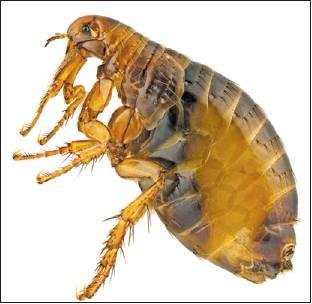Watch out for fleas and heartworms
Last month I talked about ticks and the many problems they can cause.
This month the discussion turns to fleas and heart-worms and our pets.
I’ll start with those pesky little fleas who …
This item is available in full to subscribers.
Subscribe to continue reading. Already a subscriber? Sign in
Get 50% of all subscriptions for a limited time. Subscribe today.
Please log in to continueNeed an account?
|
Watch out for fleas and heartworms
Last month I talked about ticks and the many problems they can cause.
This month the discussion turns to fleas and heart-worms and our pets.
I’ll start with those pesky little fleas who happen to be great at reproducing.
Seeing a few fleas is only the tip of the iceburg. Adult fleas represent only 5% of the flea population, but females begins egg production with 1-2 days after taking her first blood meal.
She can produce 40-50 eggs per day. The entire life cycle of eggs to adult can take as little as 12-14 days if conditions are right or can be delayed for up to 6 months.
Flea prevention is best done on a year round basis especially here in the South with our warm humid climate.
Just because you don’t see fleas on your pet, doesn’t mean they aren’t present in the environment.
Your pet can pick up fleas at any time. Talk with your veterinarian about the best medications to use for flea prevention.
Over-the-counter flea control products are not as potent and therefore not as effective as the prescription products you can get from your veterinarian.
Some products are designed just for dogs and can be toxic if used on your cat.
You should be treating all the pets in the house and/ or yard. If you only treat the pet that is itching, he or she will become reinfested by other pets in the house even though they may not be itching.
If you think your pet won’t get fleas because he or she stays in a fenced in back yard, guess again. Opossums and raccoons spread fleas whether in adult form or from eggs falling off their bodies. They are quite prevalent in the suburbs and even in town.
A nice benefit of many of the flea products available is that they often help protect against other parasites, too.
Unfortunately, there is no product that “does it all.”
There are flea and tick combinations or flea, heart-worm, and intestinal parasite combinations which can benefit you and your pet. Some owners hesitate to use flea products because they fear toxicity.
Prescription flea control products undergo extensive testing to be approved by the FDA. This doesn’t mean there aren’t any potential side effects, but ask your veterinarian what they recommend and why. Ask what they use for their pet.
Heartworms are another real danger to your pet. They are transmitted through mosquito bites.
Fortunately, heartworms are easy to prevent with both oral and topical products available. Don’t be lulled into a false sense of security just because your pet is an indoor pet. How many times have you killed a mosquito that was inside your house?
Another problem with heartworms is you can’t see the parasite. The clinical signs of coughing, exercise intolerance, and heart failure may not appear until the disease is more advanced. In some pets this can take years.
Adult heartworms damage and obstruct pulmonary (lung) arteries which then begin to affect the heart and can lead to other organs being damaged.
Heartworm disease causes lasting damage to the heart, lungs and arteries, and can affect the dog’s health and quality of life long after the parasites are gone. This is why prevention is by far the best option. Treatment should be administered as early in the course of the disease as possible.
Heartworm disease in cats is very different from heart-worm disease in dogs. Most worms in cats do not survive to the adult stage.
This means heartworm disease often goes undiagnosed in cats. The medication used to treat heart-worm infections in dogs cannot be used in cats, so prevention is the only means of protecting cats from the effects of heart-worm disease.
The American Heart-worm Society recommends that you “think 12” for your dog: get your dog tested every 12 months for heart-worms, and give your dog heartworm preventive 12 months a year.
Cats should be tested before being put on prevention. Because there is no approved treatment for heart-worm infection in cats, year round prevention is critical.
As with any medication, talk with your veterinarian about what is best for your pet.
Only use heartworm prevention products that are tested and proven effective by the U.S. Food and Drug Administration (FDA).
Other items that may interest you












Comments
No comments on this item Please log in to comment by clicking here